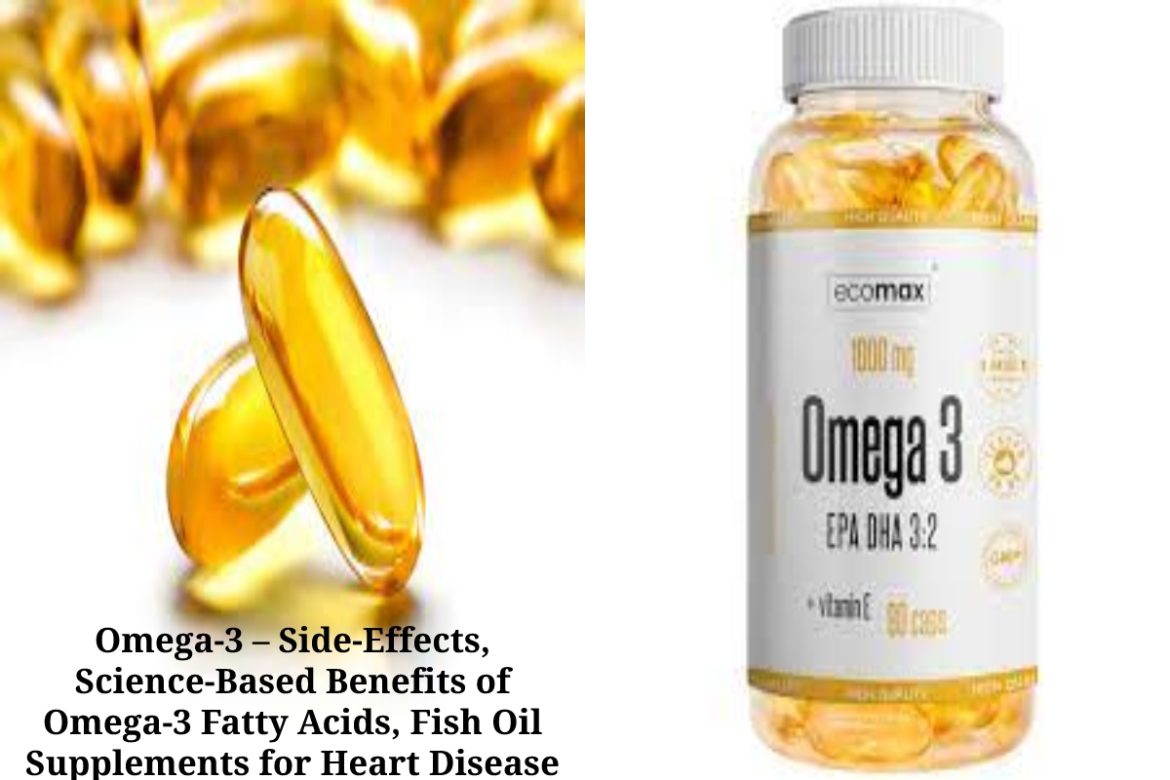What is Omega-3?
Omega-3 fatty acids are essential fats that you should get from your diet. Omega-3s are a family of critical fatty acids that play a crucial role in the body and can provide several health benefits. Since your body cannot make them independently, you need to get them from your diet.
The three most important types are ALA (alpha linolenic acid), DHA (docosahexaenoic acid) and EPA (eicosapentaenoic acid). ALA is found mainly in plants, whereas DHA and EPA are found in animal products and algae. Common foods rich in omega-3 fatty acids include fatty fish, fish oil, flax seeds, chia seeds, flaxseed oil, and walnuts.
Omega-3 supplements like fish oil or seaweed oil are often suitable for people who don’t eat these foods in large quantities.
Omega-3 Fish Oil Side Effects
Side effects of omega-3 fish oil can include:
- Fishy taste in the mouth
- Fish Breath Fish
- Stomach ache
- loose stools
- Nausea
- Taking more than 3 grams of fish oil daily can increase the risk of bleeding.
If you wish to take higher doses of omega-3 fish oil supplements, consult your doctor first. And then, your doctor may recommend that you supplement your diet with omega-3 fish oil. Additionally, your doctor can monitor all aspects of your health if you take higher doses of fish oil. Prescription omega-3s are also available for people with very high triglyceride levels.
Scientific Benefits of Omega-3 Fatty Acids
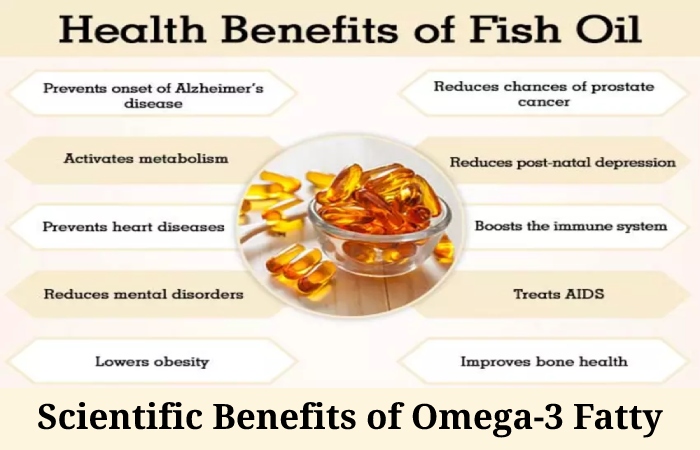
Omega-3 fatty acids are essential. They are very beneficial for your body and brain. Several nutrients have been considered as thoroughly as omega-3 fatty acids.
Here are the Scientifically Backed Health Benefits of Omega-3 Fatty Acids.
1. Omega-3s Can Fight Anxiety And Depression

Anxiety, also a common condition, is characterized by constant restlessness and nervousness. Depression is one (1) of the common mental disorders in the world. Symptoms include lethargy, sadness, and a general loss of interest in life.
2. Omega-3s Can Improve Eye Health
DHA, a type of omega-3, is an essential structural component of the retina. When you don’t get enough DHA, vision problems can occur. Interestingly enough, getting enough omega-3s is associated with a reduced risk of macular degeneration, one of the leading causes of permanent eye damage and blindness in the world.
3. Omega-3s Can Help Brain Health During Pregnancy And Early Childhood.

Omega-3s are essential for the growth and development of babies’ brains. DHA makes up 40% of the polyunsaturated fatty acids in the brain and 60% in the retina. Therefore, it is not surprising that children fed formula fortified with DHA had better eyesight than children fed without formula.
Getting enough omega-3s during pregnancy has been linked to numerous benefits for your baby, including
- Higher intelligence
- Better communication and social skills
- Less behavioural problems
- Reduced risk of developmental delay
- Reduced risk of ADHD, autism and cerebral palsy.
4. Omega-3s Can Fight Inflammation.
Inflammation is a natural reaction to infection and damage to your body. Therefore, it is vital to your health.
Long-term inflammation can contribute to nearly all chronic Western diseases, including heart disease and cancer.
In particular, omega-3 fatty acids can reduce the production of molecules and substances associated with inflammation, such as inflammatory eicosanoids and cytokines.
Studies have consistently observed a link between increased omega-3 intake and decreased inflammation.
5. Omega-3s Can Fight Against Autoimmune Diseases

In autoimmune diseases, your immune system blunders healthy cells for external ones and starts attacking them. Basically, Type 1 diabetes is an outstanding example of where the immune system attacks the insulin-producing cells in the pancreas.
Omega-3s can compete with some of these diseases and may be especially important during the first few years of life. And also, Omega-3s also help with lupus, rheumatoid arthritis, ulcerative colitis, Crohn’s disease, and psoriasis.
6. Omega-3s can Improve Mental Health Problems.
Low levels of omega-3s have been stated in people with mental disorders. And also, research shows that omega-3 supplements can reduce mood swings and relapses in people with schizophrenia and bipolar disorder.
Omega-3 fatty acid supplements can also reduce aggressive behaviour.
7. Omega-3s can Fight Age-Related Mental Decline and Alzheimer’s Disease.
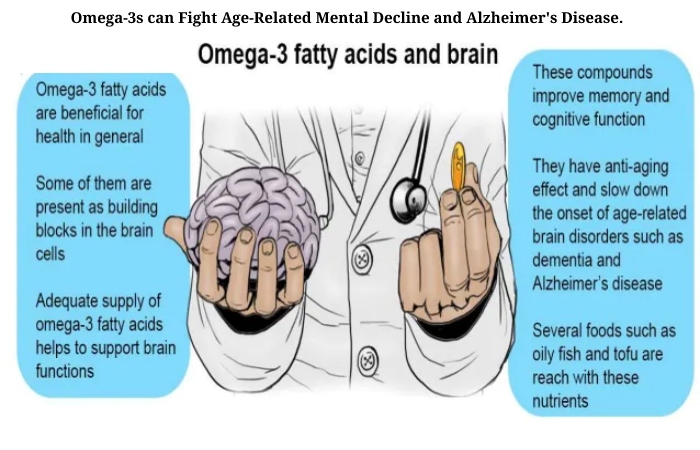
Impaired brain function is one of the inevitable consequences of ageing. And also, several studies have linked higher omega-3 intake to decreased age-related mental retardation and a lower risk of Alzheimer’s disease.
Moreover, keep in mind that more research is required on omega-3s and brain health.
8. Omega-3s can Help Prevent Cancer
Cancer is a leading cause of death in the Western world, and omega-3 fatty acids reduce the risk of some cancers. Fascinatingly, research shows that people who consume the most omega-3s have a 55% lower risk of colon cancer.
Additionally, omega-3 intake reduces the risk of prostate cancer in men and breast cancer in women. However, not all studies yield the same results.
9. Omega-3s can Reduce Asthma in Children.
Asthma is a chronic lung condition with symptoms such as cough, shortness of breath, and wheezing.
However, severe asthma attacks can be dangerous. And also, they are triggered by inflammation and swelling of the airways of the lungs.
10. Omega-3s can Improve Bone and Joint Health.
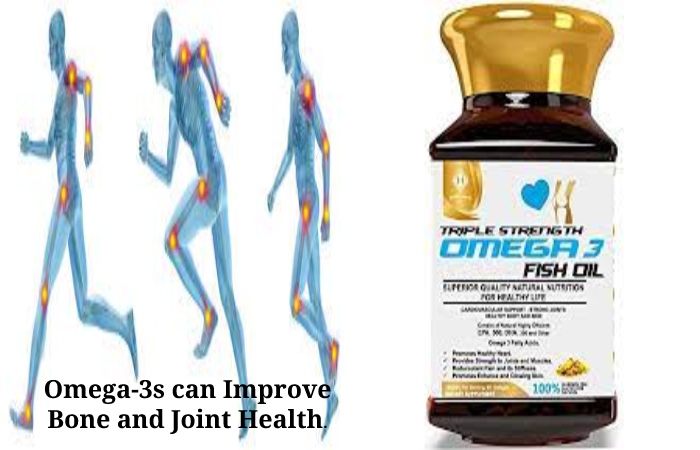
Osteoporosis and arthritis are two common conditions that affect the skeletal system. Furthermore, research shows that omega-3s can improve bone strength by increasing calcium in the bones, leading to a lower risk of osteoporosis.
Omega-3s can also treat arthritis. Patients taking omega-3 supplements report reduced joint pain and increased grip strength.
11. Omega-3 Fatty Acids can Improve Sleep.
Sound sleep is the foundation of optimal health. Research has linked sleep deprivation to many diseases, including obesity, diabetes, and depression. Basically, low levels of omega-3 fatty acids lead to sleep problems in children and obstructive sleep apnea in adults. Moreover, studies in children and adults show that taking omega-3 supplements increases the duration and quality of sleep.
12. Omega-3 Fats are Suitable for the Skin.
DHA is a structural constituent of your skin. It is responsible for the health of the cell membranes that make up most of the skin.
A healthy cell membrane leaves the skin soft, moist, supple, and wrinkle-free. Moreover, EPA also assists your skin in several ways, including:
- Manage oil production and skin hydration.
- To prevent hyperkeratinization of hair follicles, which manifests itself as small red bumps often visible on the shoulders.
- Reduce premature skin ageing.
- Reduce the risk of acne.
Omega-3s can also defend the skin from sun damage. EPA helps block the release of ingredients that absorb skin collagen after sun exposure.
Omega 3 – Fish Oil Supplements for Heart Disease
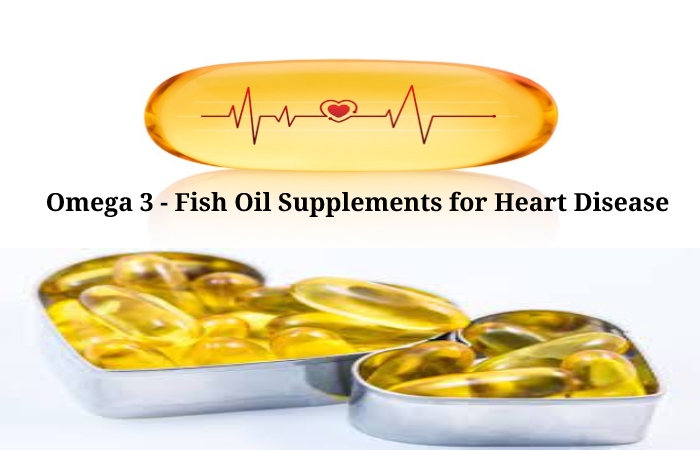
Omega-3 fish oil contains docosahexaenoic acid (DHA) and eicosapentaenoic acid (EPA). However, Omega-3 fatty acids are essential nutrients that are important in the prevention and treatment of heart disease.
Over the past ten years, numerous Americans have turned to omega-3 fish oil supplements, which are beneficial for healthy people and heart disease.
The results show that omega-3 fatty acids can help:
- Low blood pressure
- Reduce triglyceride levels
- Slows down the formation of plaque in the arteries
- Reduce the likelihood of irregular heart rhythm
- Reduce the possibility of heart attack and stroke
- And also, Reduce the likelihood of sudden cardiac death in people with heart disease
The American Heart Association (AHA) states that taking up to 3 grams of fish oil per day in supplement form is considered safe. Do not take more unless you talk to your doctor first.
Conclusion
Omega-3 fatty acids are vivacious for optimal health. Foods, such as oily fish, twice a week are the best way to ensure a steady intake of omega-3s. However, if you don’t eat much oily fish, you might want to consider taking an omega-3 supplement. For people with omega-3 deficiencies, it is an inexpensive and highly effective way to improve health.
Also Read: Lychee – Nutrition Facts, Health Benefits, Adverse Effects, One of the Natural-born killers
Related Searches:
[omega-3 benefits]
[omega-3 foods]
[omega 3 capsules]
[omega-3 tablets]
[omega-3 foods vegetarian]
[what is omega-3 good for]
[omega-3 supplement]
[omega-3 supplements]


